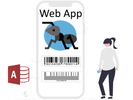
There are many web APIs (Application Programming Interfaces) available today, but some of the most popular ones are:
Google Maps API: The Google Maps API is used to build web apps that use Google Maps. It has tools like geocoding, tracking, and search that can be used to make custom maps and location-based apps.
Facebook API: The Facebook API is used to build web apps with Facebook functions. It has tools like login, sharing, and a social graph that can be used to make social networking and marketing apps.
Twitter API: The Twitter API is used to build web apps with Twitter features. It has tools like tweets, feeds, and search that can be used to make social networking and marketing apps.
Amazon Web Services (AWS) API: Web apps can use AWS API to connect to Amazon's cloud services. It has tools like storage, computing, and email that can be used to make cloud-based apps.
PayPal API: The PayPal API is used to add features from PayPal to web apps. It has a number of tools that can be used to make e-commerce apps, such as payment processing, returns, and complaints.
Google Drive API: The Google Drive API is used to build web apps that use Google Drive features. It has a number of tools, such as file control, sharing, and syncing, that can be used to make applications that help people work together and get things done.
LinkedIn API: The LinkedIn API is used to add features from LinkedIn to web apps. It has a number of features, such as login, personal data, and job ads, that can be used to make applications for professional networking and hiring.
API stands for Application Programming Interface. The YouTube API is used to add YouTube functions to web apps. It has a number of tools, such as video management, viewing, and search, that can be used to make apps for sharing videos and selling them.
These are just a few of the most common computer APIs that people use today. When you use web APIs, you can save time on programming, add more features, and make the user experience better.